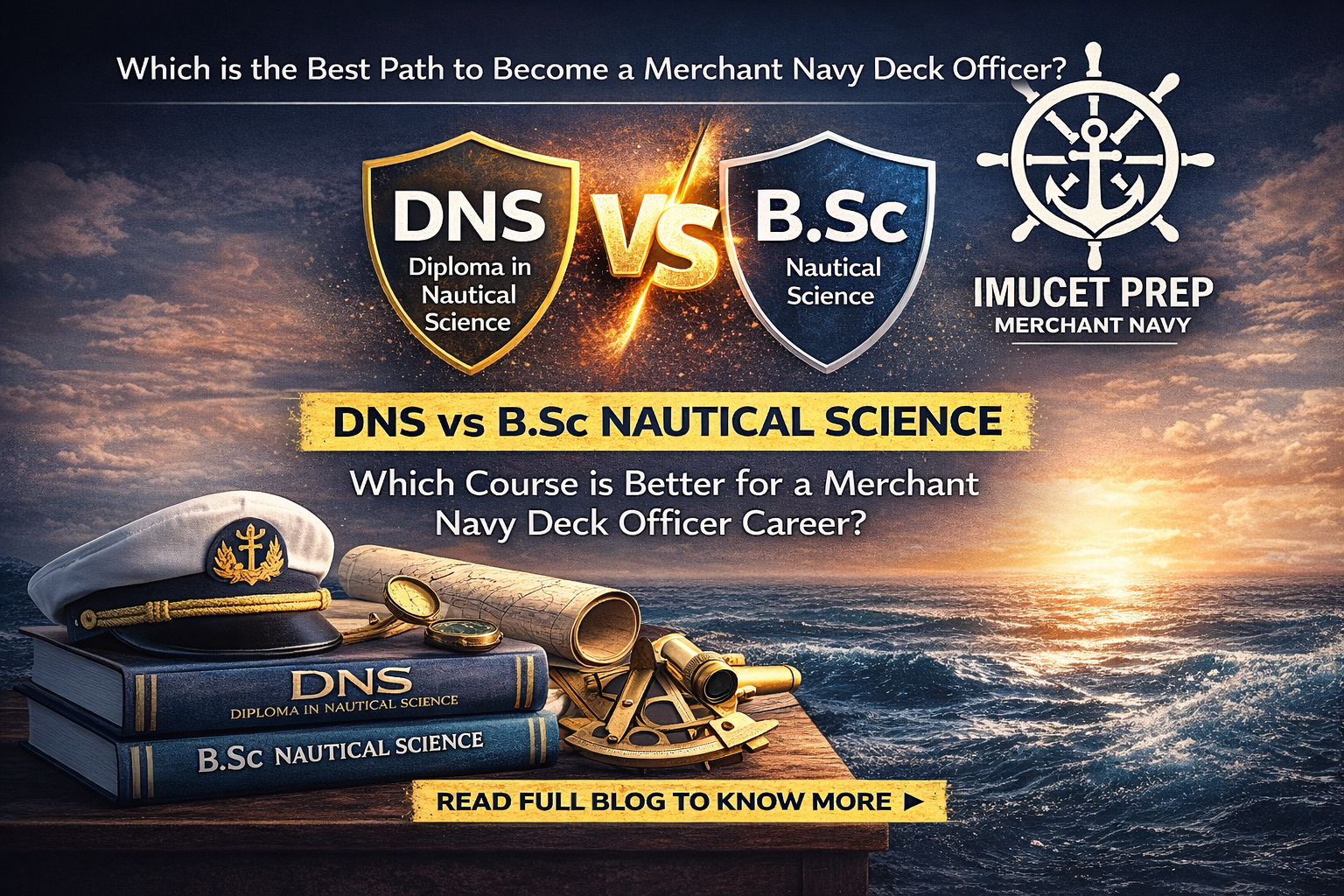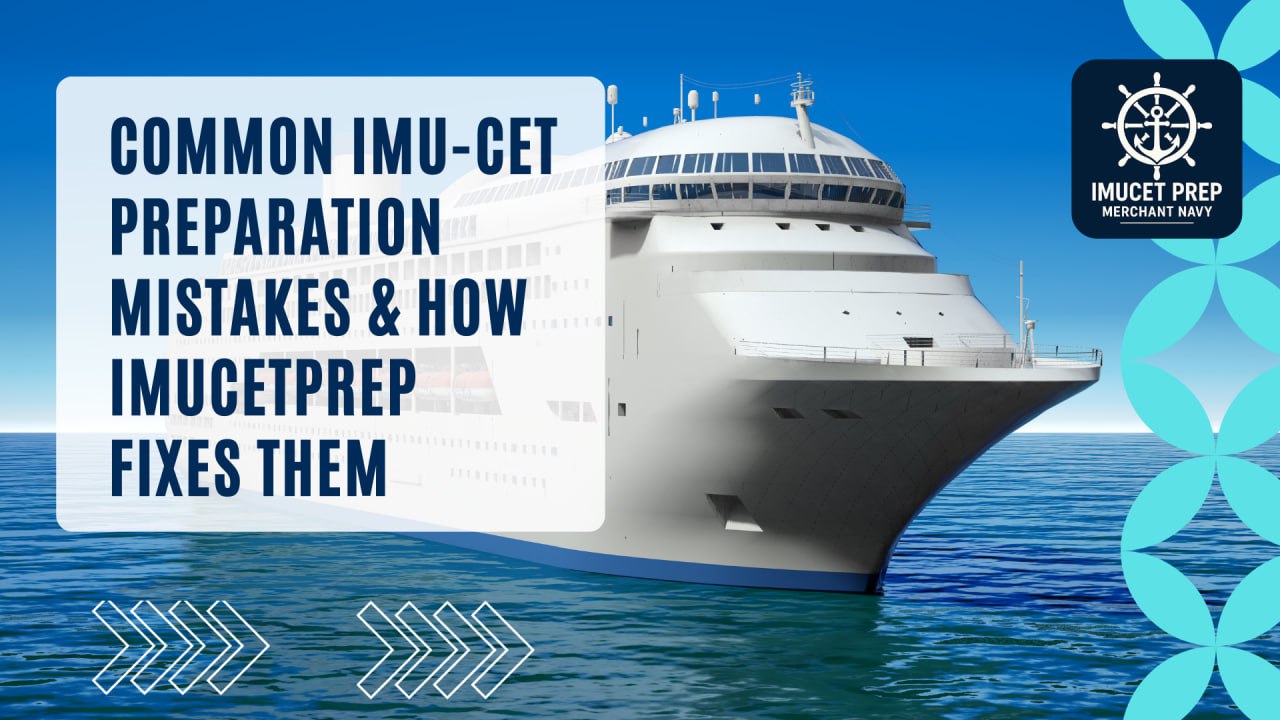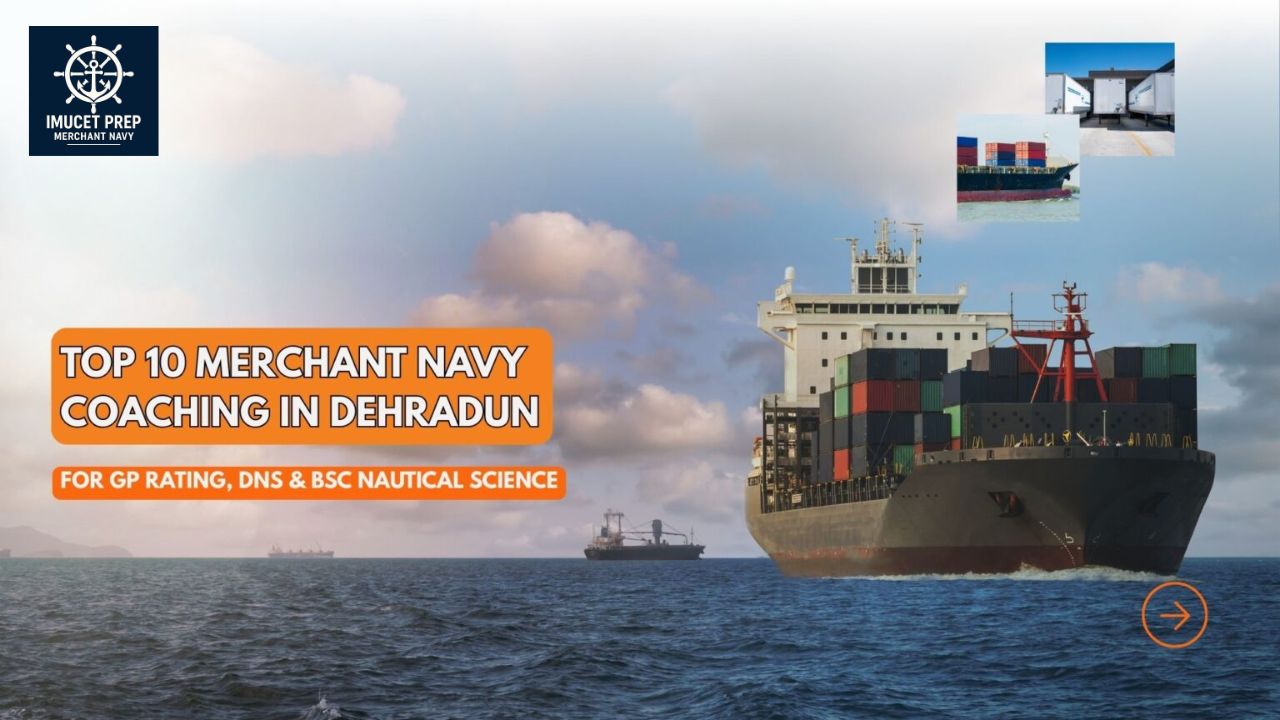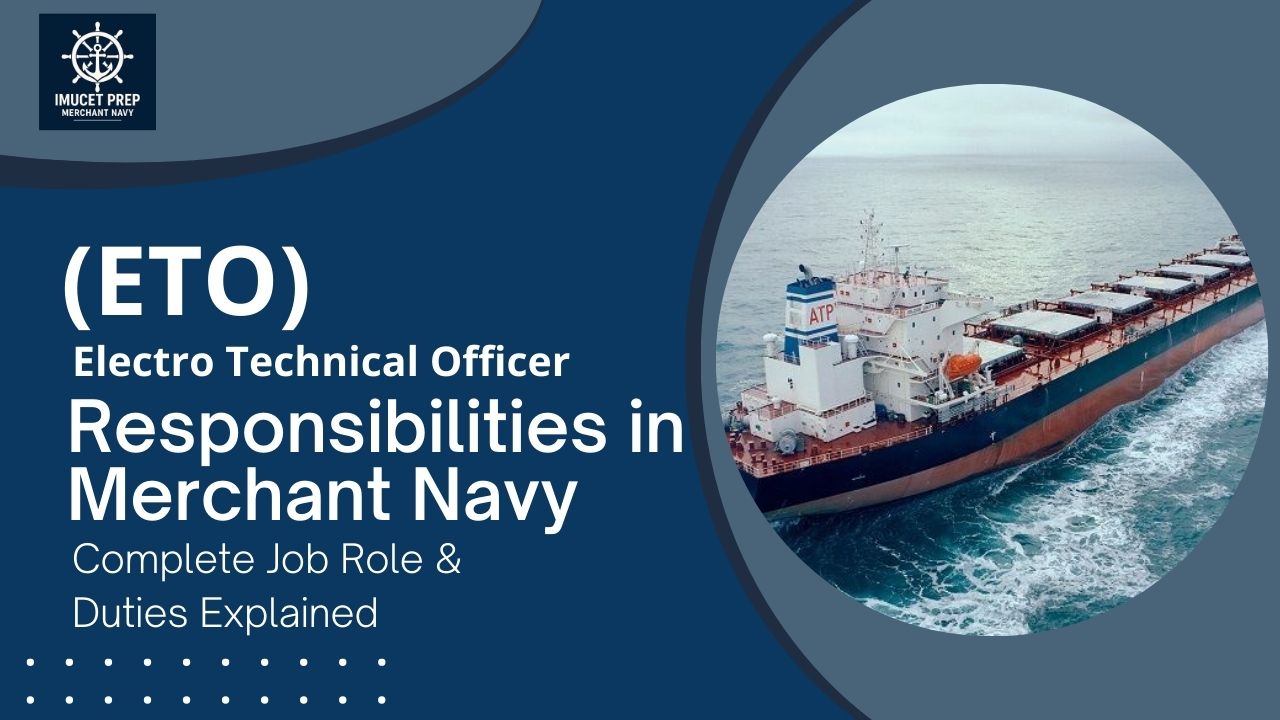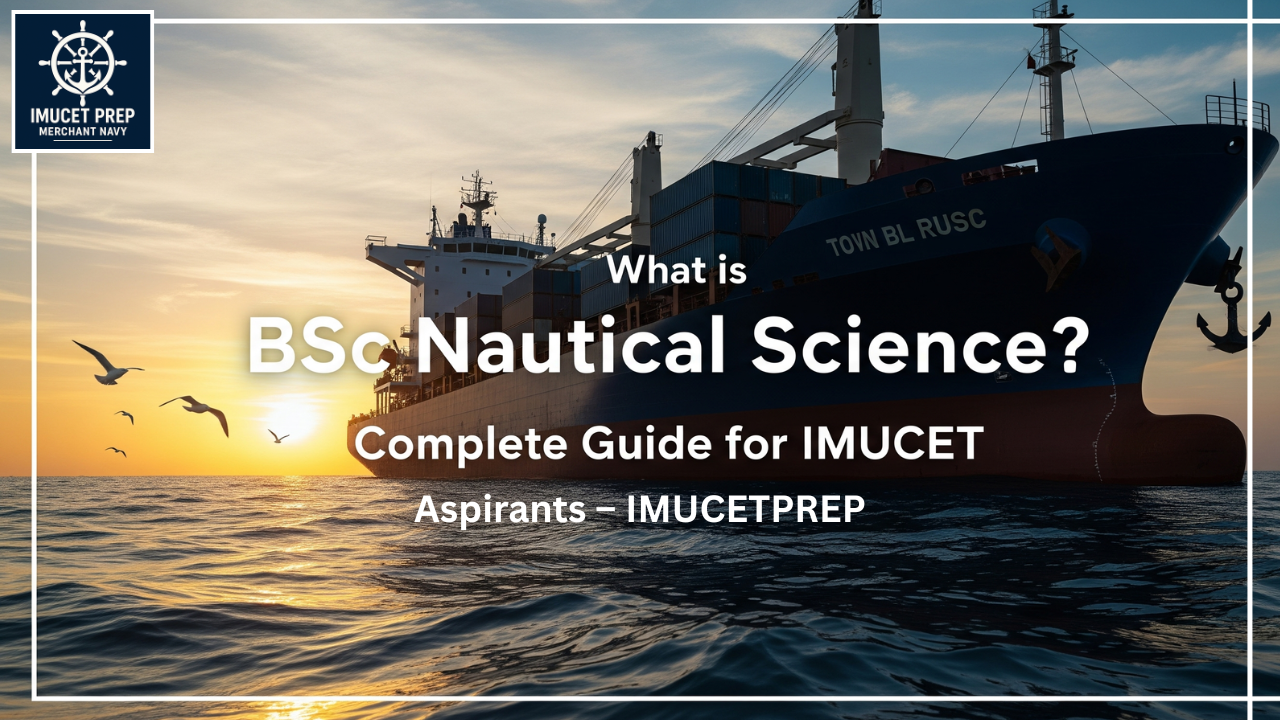
What is BSc Nautical Science? Complete Guide for IMUCET Aspirants – IMUCETPREP
When students start searching for careers in the merchant navy, the first question that pops up is “What is BSc Nautical Science?” If you’re dreaming about sailing across oceans, managing giant ships, and living a life full of adventure, then this course is usually your entry ticket. But many students remain confused—what exactly is this degree, how does it differ from marine engineering, and what happens after completing it? Let’s break it all down in the most simple yet detailed way.
What is BSc Nautical Science?
To put it simply, BSc Nautical Science is a 3-year undergraduate program that trains students to become deck officers in the merchant navy. Unlike marine engineering which focuses on machinery and engines, this course is all about navigation, cargo handling, ship operation, and maritime laws.
Think of it like this: a ship is a small floating city. Marine engineers take care of the power plant and technical side, while nautical science graduates are responsible for navigation, safety, and cargo management. Without them, ships cannot sail safely across international waters.
Course Overview
You may now wonder, what do students study in this degree? It’s not only theory, but also practical training.
- Duration: 3 years (6 semesters) followed by 12 months onboard training.
- Major Subjects: Navigation, Seamanship, Ship Stability, Meteorology, Cargo Work, Maritime Laws, and Communication skills.
- Practical Exposure: Ship simulators, workshops, and field training in ports.
One small difference that aspirants often overlook is that this course is academic in the beginning but later becomes very practical once you step onto the ship.
Is BSc Nautical Science Different from Marine Engineering?
Yes, absolutely. Marine engineering is more like mechanical + electrical engineering applied to ships. On the other hand, BSc Nautical Science is focused on the deck side. If you want to handle navigation, route planning, and later rise to the rank of Captain, this is your field.
A simple way to understand: Marine engineers are the backbone, while nautical science officers are the brain and eyes of the ship. Both are vital, but the paths and responsibilities are very different.
Eligibility & Requirements
Before diving in, let’s clarify who can apply for this course.
- Educational Qualification: 10+2 with Physics, Chemistry, and Mathematics (PCM). Minimum marks: 60% aggregate.
- Age Limit: Generally not more than 25 years (relaxation for reserved categories may apply).
- Medical Fitness: Must be physically and medically fit, including good eyesight (6/6 vision, no color blindness).
- English Requirement: At least 50% marks in English either in 10th or 12th.
You might be asking—do all students with PCM qualify? Not exactly. Medical standards are strict. Even minor eyesight problems may create hurdles.
Do You Need PCM in 12th for BSc Nautical Science?
Yes, it’s compulsory. Without PCM, admission is not possible because the science subjects form the foundation of ship navigation and technical knowledge.
Our Coaching Method: Simple, Focused, Effective
Coaching isn’t about stuffing your brain. It’s about understanding, application, and strategy. At IMUCETPrep, we follow a simple rule:
Assess – Teach – Test – Improve
- Teach concepts from scratch
- Dive into doubt sessions weekly
- Use real exam-style questions to practice
- Provide regular feedback
And we make sure no student feels left out.
Admission Process For BSc Nautical Science
This is the part where most students get confused, especially about IMUCET.
- Step 1: Appear for IMUCET (Indian Maritime University Common Entrance Test). It’s the main gateway for admission to IMU campuses and many affiliated colleges.
- Step 2: Clear the exam and participate in counseling.
- Step 3: Medical fitness test by a DG Shipping approved doctor.
- Step 4: Final admission and joining.
Some private institutes do admit students without IMUCET, but for a solid career and recognized degree, going through IMUCET is the safest bet.
What is the IMUCET Exam Pattern for BSc Nautical Science?
The IMUCET exam is computer-based and tests your knowledge in:
- English
- General Aptitude
- Physics
- Chemistry
- Mathematics
Questions are objective type, and the exam is not considered too tough if you have a strong 12th PCM background.
Fees & Colleges
One of the common doubts: how much does this course cost?
- Average Fee: ₹2.5 – ₹3.5 lakhs per year depending on the institute.
- Top Colleges under IMU:
- Tolani Maritime Institute, Pune
- Anglo Eastern Maritime Academy
- IMU Campuses (Chennai, Mumbai, Kolkata, Kochi, Vishakhapatnam)
- TS Chanakya, Navi Mumbai
Some colleges also provide sponsorships where shipping companies fund your studies, and you get a confirmed placement.
Are Scholarships Available?
Yes, a few state governments, private institutions, and maritime organizations offer scholarships. They are usually merit-based or need-based. So if finance is a concern, do check with the college before admission.
Career Opportunities
So, what happens after completing this course?
- After Graduation: You undergo 12 months of onboard training as a deck cadet.
- Next Ranks: Third Officer → Second Officer → Chief Officer → Captain (Master).
- Industries: Merchant navy, shipping companies, port management, and offshore industry.
Some students later move into shore-based jobs like maritime logistics, port operations, or teaching.
What is the Salary After BSc Nautical Science?
This is probably the most exciting part. Salaries in the merchant navy are high compared to many land jobs.
- Deck Cadet (training period): ₹30,000 – ₹50,000 per month.
- Third Officer: ₹1.5 – ₹2 lakh per month.
- Second Officer: ₹2.5 – ₹3.5 lakh per month.
- Chief Officer: ₹4 – ₹6 lakh per month.
- Captain: ₹7 – ₹10 lakh per month (sometimes more on foreign vessels).
These figures vary by company and type of vessel, but overall, it’s financially rewarding.
Can You Become a Captain After BSc Nautical Science?
Yes, this is the path. Starting as a cadet, you gradually rise through exams, training, and sea service. With experience, determination, and discipline, you can command a ship as a Captain.
But remember, it’s not instant—you’ll need to clear several competency exams conducted by DG Shipping. The journey can take 10–12 years depending on performance and opportunities. Still, once you hold the title of Captain, it’s one of the most respected and highest-paying positions in the maritime industry.
Life & Training in BSc Nautical Science
The life of a nautical science student is not like a normal college student. Alongside classes, you’ll be trained in discipline, teamwork, and responsibility. Later, onboard life brings challenges: long months at sea, harsh weather, and staying away from family.
But on the brighter side, you’ll see different countries, cultures, and sunsets from the middle of the ocean—experiences very few people get.
What Skills are Required?
- Leadership and decision-making
- Problem-solving
- Good communication
- Technical knowledge
- Ability to stay calm under pressure
Without these, surviving at sea can be tough.
How Tough is Life at Sea?
Well, it’s not a vacation cruise. Expect 8–12 hour shifts, safety drills, and handling emergencies. Yet, the sense of pride when you dock a giant vessel safely is unmatched.
The toughest part for many cadets is staying away from family for months at a time. Weather can be unpredictable, and sometimes you’ll be sailing through storms or high waves. But the bond you build with your crew, the discipline you develop, and the once-in-a-lifetime views of oceans and ports make the hardships worth it.
Future Scope After BSc Nautical Science
Not every graduate wants to spend their whole life at sea. Thankfully, there are plenty of options:
- Higher studies like MSc Nautical Science, MBA in Shipping & Logistics.
- Transition to shore jobs in shipping companies, logistics, or port authorities.
- Teaching and research in maritime universities.
The field is broad and not limited to sailing alone.
Is BSc Nautical Science a Good Career Choice in 2025 and Beyond?
With global trade constantly increasing, the shipping industry is not slowing down. In fact, demand for trained seafarers remains high. The career brings high salaries, international exposure, and a respected lifestyle.
However, it also demands sacrifices—long periods away from family, a strict lifestyle, and challenging conditions. If you’re ready for that, it’s one of the most adventurous and rewarding professions.
Conclusion
So, coming back to our first question: “What is BSc Nautical Science?” It’s not just a degree—it’s a professional journey that turns you into a skilled officer ready to take charge of a ship. Through IMUCET, you enter a challenging yet exciting world where hard work pays off in the form of financial stability and an adventurous life.
If you’re preparing for this path, IMUCETPREP is here to guide you with the right resources, practice tests, and mentorship to crack IMUCET and begin your nautical career with confidence.


